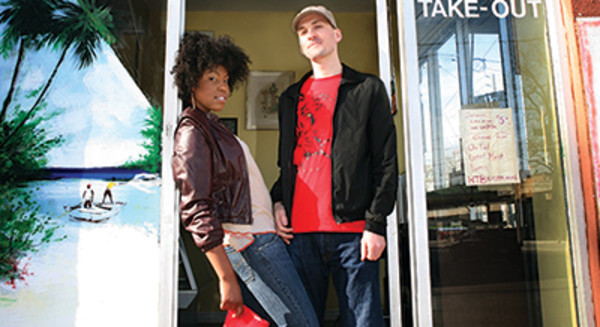Bonjay: Rock the Party
Alana Stuart’s parents immigrated to Canada as part of the country’s Caribbean influx of the […]
Bonjay: Rock the Party
Alana Stuart’s parents immigrated to Canada as part of the country’s Caribbean influx of the […]

Alana Stuart’s parents immigrated to Canada as part of the country’s Caribbean influx of the 1970s. When Stuart was a toddler, her Grenadian mother and Jamaican father threw parties that swelled to the early morning with plenty of music, food, liquor, and language from the many isles of the West Indies. “I actually have a picture of me in just a diaper and you can see people’s legs hanging off the couch, a bottle of brandy, and my mom serving breakfast,” Stuart recalls. “It was a time when all the islands mixed. It was this cool, warm vibe where partying was about getting together, meeting different people, and a sense of community.”
Despite her roots, Stuart started off making “bubblegum R&B.” “I started writing really shitty songs about boyfriends who were calling other girls on the cell phones I got them,” she admits. “By age 17 or 18 I hooked up with some producers and got some songs on the urban station in Toronto. But it was really clean, sweet pop, and I just got sick of it.”
Around that time she happened upon one of Ian Swain’s Disorganized parties–an “open concept” affair (Swain’s words) in a modest space above an Italian restaurant in Ottawa’s Chinatown. “Ian played Bugz in the Attic’s remix of ‘Hold It Down,’ and I was like, ‘Oh my God! What is this music?’ I had never heard anything that was in that vein. I told him that I had to work with him.”
“Ian came up with the idea of us doing a live soundsystem but I never ever thought I would really do it,” continues Stuart, who started off singing patois reinterpretations of indie rock hits (Yeah Yeah Yeahs’ “Maps,” TV on the Radio’s “Staring at the Sun”) at the club. “I had never spoken patois growing up, much less sang it, but [Ian] really pushed hard for it and had this vision.”
“At soundclashes, they’ll do patois versions of Michael Jackson songs because it’s a big crowd-pleaser,” explains Swain, a.k.a. DJ Pho. “If people hear something that they recognize, but it’s flipped differently, then that’s always gonna make them go crazy. And we go in this weird direction that’s sort of dancehall-meets-soul-vocals-meets-this London-y kind of sound.”
That mongrel ethos shines through on Bonjay‘s first release, the mixtape Bangarang Business. Intended to recreate the feel of a live Bonjay/Disorganized gig, it features covers and original Bonjay material spliced with hip-hop, R&B, and reggae hits, and breakbeat instrumentals. Swain samples underground jams by Madlib and Seiji on the tape, but the inclusion of Jill Scott’s “Be Happy” and TLC’s “Creep” are clearly Stuart’s influence.
“We had an idea of what we felt represented us,” says Stuart. “I grew up singing gospel music but lived in a middle-class white suburb in Ottawa, so all the dances I had in my basement were to Aerosmith and Ace of Base.”
“You love Ace of Base,” interrupts Swain, laughing hard. “I’ve never seen someone love Ace of Base that much.”

